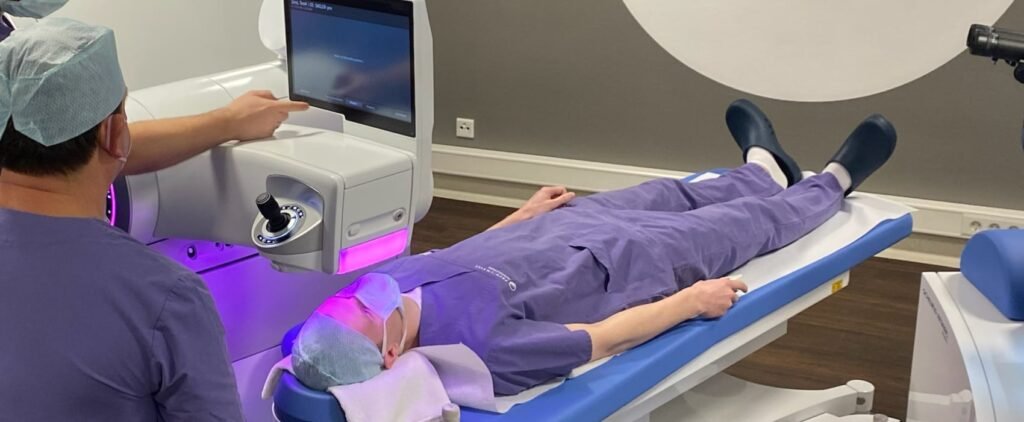In recent years, SMILE eye surgery (Small Incision Lenticule Extraction) has become a highly sought-after option in the world of medical tourism. With its minimally invasive technique, quick recovery, and long-lasting vision correction, it’s no surprise that thousands of patients travel abroad to undergo the procedure at a fraction of the cost.
But is it safe to combine international travel with an eye surgery—even a laser one? In this guide, we’ll cover the benefits, risks, and practical safety tips to help you make an informed decision.
🏥 1. Access to Specialized Surgeons and Technology
Top destinations for SMILE surgery often house high-volume surgical centers with seasoned ophthalmologists. Countries like Thailand, Turkey, and India boast:
- Board-certified eye surgeons
- Internationally accredited clinics (e.g., JCI, NABH)
- State-of-the-art laser equipment
🧘 2. Combining Surgery with a Recovery-Friendly Vacation
Recovery from SMILE is relatively fast—many patients return to most activities within 24–72 hours. Medical tourists often combine their trip with light sightseeing, spa recovery, or wellness retreats.
- A scenic destination can reduce stress and promote healing.
- Packages often include airport pick-up, hotel stay, and follow-ups.
⚠️ Risks and Challenges of Traveling for SMILE Surgery
⏱ 1. Limited Time for Follow-Up Care
Unlike local surgery, traveling for SMILE limits the window for post-op monitoring. Most complications—though rare—occur within the first week.
Risk: If you’re flying home too early, you might miss crucial follow-up visits for healing, inflammation, or vision refinement.
Tip: Stay at least 5–7 days after surgery to complete follow-up checks.
🛫 2. Flying Soon After Eye Surgery
Air travel is not inherently dangerous after SMILE, but dry cabin air, light sensitivity, and post-op eye drop needs can make it uncomfortable.
Risk: Delayed healing or discomfort if flying within 48 hours of surgery.
Tip: Fly 48–72 hours post-op, bring preservative-free lubricating drops, and wear sunglasses.
🌐 3. Variability in International Standards
Not all clinics abroad meet Western sterilization or safety standards.
Risk: Infection or suboptimal outcomes in under-regulated centers.
Tip: Choose clinics with:
- International accreditation (e.g., JCI, ISO, NABH)
- Surgeons who trained or practiced in the U.S./EU
- Positive reviews from medical tourists
💊 4. Difficulty Getting Post-Op Support at Home
If issues arise after returning home, your local doctor may be hesitant to manage a case they didn’t perform.
Risk: Delayed or fragmented care if you need corrections, enhancements, or treatment for side effects.
Tip: Ask the foreign clinic for:
- A complete medical report to bring home
- Virtual follow-up consultations
- Referral support in your home country
✈️ Who Is a Good Candidate for Traveling for SMILE Surgery?
You may be a safe and suitable candidate for medical travel if:
✅ You are healthy and don’t have a complex medical history
✅ You can commit to staying 5–7 days post-surgery
✅ You research and select a reputable clinic
✅ You have access to local eye care at home in case of emergency
✅ You’re well-prepared and follow pre- and post-op instructions closely
🛡️ Safety Checklist: How to Minimize Risk When Traveling for SMILE
| ✔️ Tip | ✅ Details |
|---|---|
| Research the clinic | Look for credentials, reviews, and outcomes |
| Stay long enough | Remain in-country for at least 5–7 days post-op |
| Understand post-op care | Know your drop schedule and avoid strenuous travel |
| Choose eye-safe flights | Delay flying for 48–72 hours, hydrate, and protect your eyes |
| Get documentation | Ask for a detailed surgery report for your local doctor |
| Plan for “what ifs” | Know where to seek local help after returning home |
🔍 Real-World Insight: What Patients Say
Many medical tourists report excellent results from SMILE abroad, especially when choosing well-established eye hospitals. However, a few cautionary tales do exist—often tied to rushed timelines, budget clinics, or poor follow-up care.
The key takeaway? You get what you research.
✨ Final Thought: Is It Safe?
Yes—traveling for SMILE eye surgery can be safe and highly rewarding, especially when done through trusted providers. The benefits of affordability, access to expert care, and fast recovery can outweigh the risks when you:
- Take time to vet your clinic
- Plan your recovery stay wisely
- Understand the logistics of travel with healing eyes




